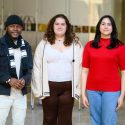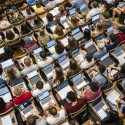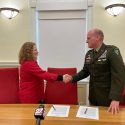UW students get taste of real-world learning
Editor’s note: When it comes to helping Wisconsin residents and the state’s economy, you Can’t Stop a Badger. This February, see how our students get a career-ready education from day one. Follow along using #CantStopABadger on social media. Your support can help us continue this work.
While learning in the classroom and lab is the foundation of a University of Wisconsin–Madison education, many students also get invaluable experience outside the classroom before graduating.
Through capstone courses, internships and partnerships with employers, students have worked on projects all over the state and nation, from a factory floor to the halls of Wisconsin’s state capitol to wildfire-prone wilderness. Frequently these experiences lead to jobs for the students.
“I feel like that’s the best way to learn: getting that actual, tangible experience,” says industrial engineering students Josie Beres, who worked on a project at GE HealthCare. “Because, yes, you can learn all the concepts in school, but actually being able to apply them and see them in action in the manufacturing line or just a company in general was a great experience.”
Here are some examples:
Which credit card is best?
In the Computer Science Department’s capstone course, students work on projects for companies ranging from Epic to Associated Bank of Madison, with the help of mentors from the companies. In the fall 2022 semester, one team built a rewards optimizer program for Capital One, to guide customers through prompts seeking their preferences on annual fees, cash back, miles and more to figure out which credit card best fits their needs. At the final presentation, the team successfully took the audience through a live demonstration of their work.
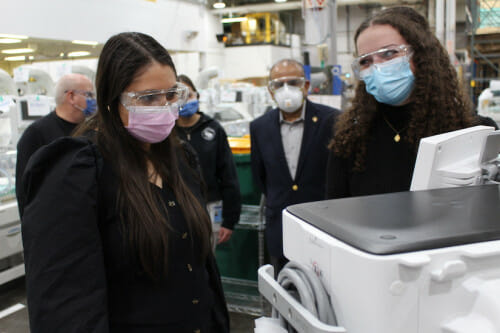
The graduating seniors in the capstone course plotted a path forward after finding unexpected results while looking at their client’s processes.
Reducing manufacturing configurations
As part of the Department of Industrial and Systems Engineering’s capstone design course, four industrial engineering students came up with recommendations that helped GE HealthCare realize it could reduce the number of configurations it offered customers for its anesthesia delivery systems, thus saving costs. Just 11 generic configurations could cover 70 percent of customer demand, they found.

Students from the La Follette School often find internships or jobs in state government in the Wisconsin state capitol. Photo: Bryce Richter
Helping make state government go
Evan Steck, a student in the La Follette School’s Accelerated Program, began working in the Wisconsin Governor’s Office as an intern during his junior year at UW–Madison. Now he serves as a senior appointments coordinator, helping the appointments director fill vacancies across more than 200 statewide boards and commissions. Combining this experience with his graduate coursework, he already is making an impact on policymaking in Wisconsin. Fellow graduate student Michael Luckey also works there, as chief of staff for a Wisconsin state senator.
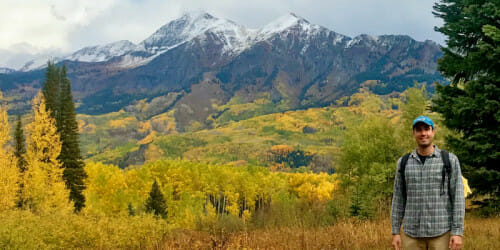
Ford Freyberg in the mountains near Crested Butte, Colarado. Photo by Natalie Bowman
Looking at wildfire risk in the West
Ford Freyberg graduated in August from the Nelson Institute’s environmental observation and informatics graduate program, after spending his last semester doing some serious field work. His final EOI summer term led him to a NASA earth science internship in Pocatello, Idaho, where he worked on a project using geospatial research to assess wildfire risk in Idaho. The team conducted research, then downloaded, transformed, and incorporated the information into a model that predicts drought-intensified wildfires.
Working on health-care enrollment
College of Agricultural and Life Sciences students spend internships at a variety of employers. For instance, life sciences communication senior Jackson Krull interned for UnitedHealth Care and he learned about processes, enrollments, and determining optional plans/products for consumers.
Subscribe to Wisconsin Ideas
Want more stories of the Wisconsin Idea in action? Sign-up for our monthly e-newsletter highlighting how Badgers are taking their education and research beyond the boundaries of the classroom to improve lives.

